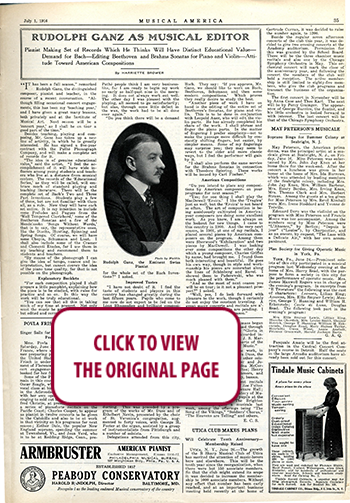 100 YEARS AGO IN MUSICAL AMERICA (151)
100 YEARS AGO IN MUSICAL AMERICA (151)
July 1, 1916
Page 35
RUDOLPH GANZ AS MUSICAL EDITOR
Pianist Making Set of Records Which He Thinks Will Have Distinct Educational Value—Demand for Bach—Editing Beethoven and Brahms Sonatas for Piano and Violin—Attitude Toward American Compositions
By HARRIETTE BROWER
“IT has been a full season,” remarked Rudolph Ganz, the distinguished composer, pianist and teacher, in the course of a recent conversation. “Although filling occasional concert engagements, this has been my ‘teaching year,’ and I have given a great many lessons, both privately and at the Institute of Musical Art. Next season will be a ‘concert year,’ as I shall be on tour a good part of the time.”
Besides teaching, playing and composing, Mr. Ganz has taken up a new line of activity, in which he is greatly interested. He has signed a five-year contract with the· Pathé Phonograph Company, and will make a complete set of records for it.
“The idea is of genuine educational value,” said the artist. “I feel the accomplishment of it will have wide influence among young students and teachers who live at a distance from musical centers. The records of the ‘Educational·Series,’ as they will be called, will embrace much of standard playing and teaching literature. There will be the complete set of Bach’s Two and Three Part Inventions. Students play a few of these, but are not familiar with them all, as a rule. Now they will have each set entire. It is my intention to include some Preludes and Fugues from the ‘Well Tempered Clavichord,’ some of the Beethoven Sonatas and a few of the Mendelssohn ‘Songs Without Words,’ that is to say, the representative ones, like the Duetto, Hunting, Spinning and Spring Songs. Of course, we will have some Chopin, Schumann and Liszt. I shall also include some of the Cramer and Clementi Etudes, for I use them in my teaching and recommend them to students and teachers.
“By means of the phonograph I can give the idea of tempo, nuance and interpretation, but cannot convey the idea of the piano tone quality, for that is not possible on the phonograph.
Explanatory Booklets
“For each composition played I shall prepare a little pamphlet, explaining how the piece is to be studied, with rules for practice and so on. In this way the work will be truly educational.
“You can see that all this is taking much of my time at present. Not only must the music be prepared and played but edited and corrected afterward. The Pathé people think I am very businesslike, for I am ready to begin my work as early as half-past nine in the morning. It does not always work out well. The other day I was pleased with the playing, all seemed to go satisfactorily; but alas, through some little defect in the wax, the work had to be all done over again.”
“Do you think there will be a demand for the whole set of the Bach Inventions?” I asked.
Improved Tastes
“I have not doubt of it. I find the taste of students and players in this country has changed greatly during the last fifteen years. Pupils who come to me now do not expect to be fed on the Liszt Rhapsodies and brilliant compositions of that caliber. They seem anxious to study more serious music, especially Bach. They say: ‘If you approve, Mr. Ganz, we should like to work on Bach, Beethoven, Schumann and then some modern compositions.’ Which proves they really desire to study the best.
“Another piece of work I have on hand is the editing of the entire set of Beethoven’s Sonatas, for piano and violin. This is to be done in conjunction with Leopold Auer, who will edit the violin parts. He has already completed his share of the work. I shall phrase and finger the piano parts. In the matter of fingering I prefer simplicity—not to make the passage more difficult by constantly shifting fingers, but easier, by simpler means. Some of my fingerings may surprise you; they may seem to revert to the older and more classic ways, but I feel the performer will gain by it.
“1 shall also perform the same service for the Brahms Sonatas in connection with Theodore Spiering. These works will be issued by Carl Fischer.”
American Compositions
“Do you intend to place any compositions by American composers on your programs for next season?”
“Yes; for one thing I shall play the MacDowell ‘Eroica.’ I like the ‘Tragica’ just as well, but the ‘Eroica’ is not heard so often. The art of composition is being assiduously cultivated in America; your composers are doing some· excellent work. As you know, I am always on the lookout for new things. I came to this country in 1900. And the very next season, in 1901; at one of my recitals, I placed several pieces by American composers on the program. Among them were Sherwood’s ‘Exhilaration’ and two pieces by MacDowell. I was looking over some compositions the other day which a young composer, Charles Griffes by name, had brought me. I found them both interesting and beautiful. He goes his own way, though in style and workmanship his pieces are somewhat along the lines of Schönberg and Ravel. I showed them to Paderewski, who was much pleased with them.”
“And so the most of next season you will be on tour; is it not a pleasant prospect?” I asked.
“Well, yes, I do look forward with pleasure to the work, though I certainly do not enjoy the constant traveling. A great many concerts and recitals are already booked and others are pending. I shall have another busy season.




 RENT A PHOTO
RENT A PHOTO





